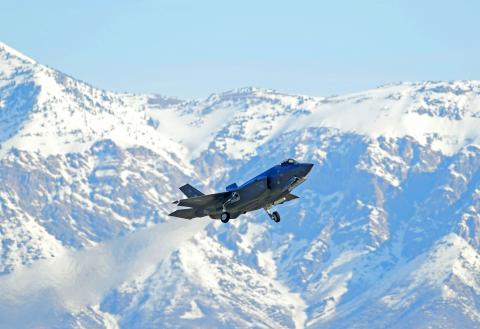The nation does not need a Terminal High Altitude Area Defense (THAAD) system, but welcomes the possibility of acquiring Lockheed Martin F-35 Lightning II multirole jets, the Ministry of National Defense said yesterday in response to speculation that the US might offer Taiwan the two systems.
Japan’s Yomiuri Shimbun on Sunday reported that the US has listed the THAAD system and F-35s in its arms sale items to Taiwan.
The proposed items are considered an attempt by the US to resume talks with Taiwan about a US$1 billion arms deal that has been put on hold.

Photo: AFP
However, the ministry yesterday said that it has not received any information from the US.
“There has been no official word from the US [about the THAAD system and F-35s], and the new US administration has yet to appoint officials on Taiwan affairs, so discussions about the arms deal have not begun,” Department of Strategic Planning Director Wu Pao-kun (吳寶琨) said during a Foreign Affairs and National Defense Committee question-and-answer session.
Deputy Minister of National Defense Cheng De-mei (鄭德美) said the nation does not need a THAAD system in the short term, as the US-made phased-array radar system at Hsinchu County’s Leshan (樂山) base is on par with the THAAD system in terms of detection capability.
However, Chinese Nationalist Party (KMT) Legislator Johnny Chiang (江啟臣) asked if the ministry would cooperate with the US if Taiwan was asked to deploy a THAAD system because of geopolitical concerns, to which Cheng said the ministry would evaluate the necessity should such an request be made.
Cheng’s comments were in slight contrast with Minister of National Defense Feng Shih-kuan’s (馮世寬) last month, as Feng said he firmly opposed the deployment of a THAAD system, because Taiwan should distance itself from the antagonism between China and the US, and that Taiwan should defend itself instead of becoming involved in other nations’ interests.
Meanwhile, fighter jets capable of short or vertical takeoff and landing, such as F-35s, are needed for war scenarios, Wu added.
New Power Party Legislator Freddy Lim (林昶佐) asked if the ministry would voluntarily reduce arms acquisitions to appease Beijing.
Cheng said the military has been developing the defense industry to reduce its reliance on arms imports and the influence of other nations.
Lim urged the ministry to procure whatever is necessary to ensure the nation’s defense capabilities, which could not be compromised due to China’s pressure.
“It is precisely because of the fear of China’s [potential military invasion] that Taiwan should build up its military and the defense capabilities cannot be compromised because of China’s opposition to arms sales,” Lim said.

Taiwan is stepping up plans to create self-sufficient supply chains for combat drones and increase foreign orders from the US to counter China’s numerical superiority, a defense official said on Saturday. Commenting on condition of anonymity, the official said the nation’s armed forces are in agreement with US Admiral Samuel Paparo’s assessment that Taiwan’s military must be prepared to turn the nation’s waters into a “hellscape” for the Chinese People’s Liberation Army (PLA). Paparo, the commander of the US Indo-Pacific Command, reiterated the concept during a Congressional hearing in Washington on Wednesday. He first coined the term in a security conference last

Prosecutors today declined to say who was questioned regarding alleged forgery on petitions to recall Democratic Progressive Party (DPP) legislators, after Chinese-language media earlier reported that members of the Chinese Nationalist Party (KMT) Youth League were brought in for questioning. The Ministry of Justice Investigation Bureau confirmed that two people had been questioned, but did not disclose any further information about the ongoing investigation. KMT Youth League members Lee Hsiao-liang (李孝亮) and Liu Szu-yin (劉思吟) — who are leading the effort to recall DPP caucus chief executive Rosalia Wu (吳思瑤) and Legislator Wu Pei-yi (吳沛憶) — both posted on Facebook saying: “I

Sung Chien-liang (宋建樑), who led efforts to recall Democratic Progressive Party (DPP) Legislator Lee Kun-cheng (李坤城), was released on bail of NT$80,000 today amid outcry over his decision to wear a Nazi armband to questioning the night before. Sung arrived at the New Taipei District Prosecutors’ Office for questioning in a recall petition forgery case last night wearing a red armband bearing a swastika, carrying a copy of Adolf Hitler’s Mein Kampf and giving a Nazi salute. Sung left the building at 1:15am without the armband and covering the book with his coat. Lee said today that this is a serious

The Ministry of Economic Affairs has fined Taobao NT$1.2 million (US$36,912) for advertisements that exceed its approved business scope, requiring the Chinese e-commerce platform to make corrections in the first half of this year or its license may be revoked. Lawmakers have called for stricter enforcement of Chinese e-commerce platforms and measures to prevent China from laundering its goods through Taiwan in response to US President Donald Trump’s heavy tariffs on China. The Legislative Yuan’s Finance Committee met today to discuss policies to prevent China from dumping goods in Taiwan, inviting government agencies to report. Democratic Progressive Party Legislator Kuo Kuo-wen (郭國文) said